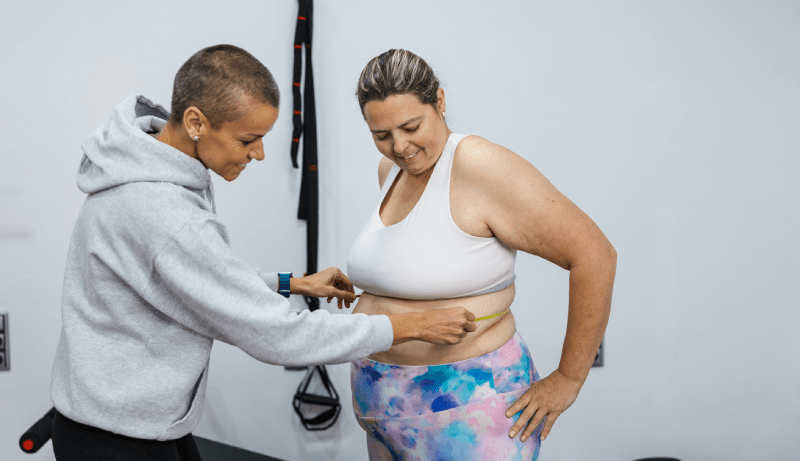Introduction: An Overview of International Weight Loss Treatments
Obesity is a serious health problem affecting millions worldwide and is considered a global health crisis. It is closely associated with numerous comorbidities such as type 2 diabetes, hypertension, sleep apnea, fatty liver disease, and heart disease. Therefore, weight loss treatments are crucial not only for aesthetic reasons but also for improving overall health, enhancing quality of life, and managing obesity-related health issues. Bariatric surgeries have been observed to be associated with a significant reduction in obesity-related adverse events (such as diabetes and cardiovascular disorders).
In the context of international health tourism, Germany and Turkey stand out as two prominent destinations for patients seeking weight loss treatments. Germany is renowned for its medical excellence, advanced technology, and stringent healthcare regulations, while Turkey attracts attention by offering high-quality care at more affordable costs and with comprehensive patient experience packages. This report aims to provide a detailed comparison of weight loss treatment methods, processes, quality standards, and costs in both countries.
Weight Loss Treatments in Germany
Germany offers a wide range of surgical, non-surgical, and medical methods for the treatment of obesity and metabolic diseases. The country is known for its high level of expertise and experienced surgeons.
Surgical Methods: Details, Processes, and Indications
Obesity surgery (bariatric surgery) in Germany is generally performed using minimally invasive approaches. The main surgical options include:
- Sleeve Gastrectomy: This procedure reduces the size of the stomach, significantly limiting food intake and lowering hunger hormone levels. It typically takes less than two hours, leaves no incisions or scars, and causes very little pain.
- Gastric Bypass: This involves rerouting the stomach and small intestine, which causes the body to absorb fewer nutrients and leads to weight loss. The long-term success of this surgery is considered good.
- Mini Gastric Bypass: A simplified version of gastric bypass that also reduces food absorption.
- Single Anastomosis Duodeno-Ileal Bypass (SADI-S) and Duodenal Switch: More complex procedures used in specific cases.
- Gastric Band: A method involving the placement of an adjustable band around the upper part of the stomach, used in special cases, particularly for adolescent patients under 18 years of age.
- Gastric Clip: Similar to the gastric band, it reduces hunger and supports healthy weight loss.
Treatment Process: The bariatric surgery process typically involves a comprehensive preparation period. Preliminary investigations take approximately 2 weeks. A protein-rich liquid diet may be required for 1-2 weeks as surgical preparation. The surgery and inpatient stay last approximately 2-5 days. Post-operative outpatient care (e.g., wound observation, nutritional counseling, diabetes adjustment) continues for about 4 weeks.
Indications and Benefits: These surgeries may be an option for patients with significant weight problems where diet and exercise have been insufficient. Benefits of bariatric surgery include the loss of approximately 60-80% of excess weight within 2 years, a long-term increase in quality of life, remission of type 2 diabetes, and significant improvement of comorbidities such as hypertension, fatty liver, dyslipidemia, and sleep apnea.
Non-Surgical and Medical Methods: Details and Applications
Germany also offers various options for non-surgical and medical weight loss:
- Gastric Balloon: A treatment that aids weight loss by placing a balloon in the stomach to limit food intake and reduce hunger.
- Endoscopic Sleeve Gastroplasty (ESG): A minimally invasive method where the stomach size is reduced using an endoscopic suturing device without the need for surgery. This procedure typically takes less than 2 hours, leaves no incisions or scars, and pain is minimal.
- Medication Treatments (GLP-1 Receptor Agonists): GLP-1 RA injection treatments like Wegovy® are used as a medical option for weight loss. The cost can be around 345€ for the initial month and 485€ per month for program extension. Additionally, a detailed consultation and physical examination may cost around 200€ quarterly, with a monthly medication cost of approximately 170€. These treatments are generally not covered by statutory health insurance.
- Digital Health Programs: Semaglutide-supported digital weight loss services (DWLS) have proven effective in Germany. One study showed that participants lost an average of 9.52% of their baseline weight after 5 months, with 81.51% achieving clinically significant weight loss (≥5%). The rate of serious side effects is low (1.88%).
- Lifestyle Programs and Mobile Health Applications: Mobile health applications for obesity management are also available in Germany. These apps offer various features such as calorie tracking, individualized exercise plans, nutrition plans, and behavioral change exercises.
Healthcare Quality Standards and Accreditation
Germany is recognized worldwide for its high-quality standards in medical care. This is supported by the country’s rigorous healthcare regulations and accreditation processes.
Hospitals in Germany include institutions like Asklepios Hospital Barmbek, recognized as the world’s No. 1 clinic for international patients by the Medical Travel Quality Alliance (MTQA). This hospital is also listed among the best German clinics by Focus magazine and holds DIN EN ISO 9001:2015 certification. Other hospitals, such as St. Martinus-Krankenhaus, have 20 years of experience and are accredited by the International Federation of Obesity and Metabolic Disorders.
Accreditation programs like DNV integrate quality and risk management principles with clinical and physical environment requirements to continuously improve patient safety and care quality. These programs aim to enhance patient safety, care quality, management confidence, and reputation. Accreditation requirements cover essential elements such as quality management systems, risk management, high-risk services like anesthesia and emergency care, medication management, patient rights, and the physical environment.
Accreditation bodies like DAkkS ensure competence and quality assurance in areas such as medical laboratory diagnostics, management systems, personnel certification, hygiene, medical products, and medical devices. Certification of quality management systems in hospitals, pharmacies, care facilities, and rescue services according to DIN 15224 is also part of this scope.
This structure indicates that Germany’s core value proposition in healthcare is built on established medical excellence, advanced technology, and strict regulations, rather than cost advantage. The higher prices paid by patients are considered an investment in this high level of quality and safety. This makes Germany an attractive destination, especially for patients seeking complex cases or specific, highly specialized interventions, who prioritize clinical excellence over cost.
Patient Experience, Success Rates, and Potential Risks
Patients undergoing weight loss treatment in Germany generally appreciate the high professionalism of doctors, the attentive and caring staff, efficient organization, and the availability of helpful translators. Most patients undergoing bariatric surgery lose 60-80% of their excess weight within 2 years. Digital weight loss programs also show clinically significant results, with an average weight loss of 9.52% in 5 months.
However, as with any surgical procedure, bariatric surgery carries general risks such as infection, blood clots, and adverse reactions to anesthesia. It is noted that modern techniques and high standards in Germany lead to quick recovery and effective results.
From a patient experience perspective, 46.63% of German participants reported feeling social exclusion and discrimination due to obesity. This highlights that weight loss treatment is not merely a physical transformation but also has a significant impact on patients’ social and psychological well-being. The perception of discrimination being higher among those treated with surgical or endoscopic methods compared to conservative treatment suggests that more pronounced weight loss or more severe initial obesity might lead to different reactions in social interactions.
Incompatibility of dietary recommendations with daily life and cultural habits can also be an issue, emphasizing the importance of individualized and culturally sensitive counseling. These findings suggest that when choosing a treatment, patients should consider not only medical outcomes but also the social and psychological dimensions of the treatment. The presence of such social challenges in Germany indicates that patients may need additional support mechanisms for post-treatment integration and long-term psychological well-being.
Weight Loss Treatments in Turkey
Turkey has emerged as a significant destination for health tourism, offering a wide range of both surgical and non-surgical weight loss treatments. The country is known for providing high-quality services at more affordable costs.
Surgical Methods: Details, Processes, and Indications
Various methods are applied in the field of obesity surgery in Turkey:
- Gastric Bypass and Mini Gastric Bypass: Aim to reduce eating habits, lower hunger hormone levels, and decrease food absorption.
- Sleeve Gastrectomy: Involves removing approximately 70% of the stomach, leading to less food consumption and suppression of hunger hormones.
- Gastric Band (Gastric Clip): Creates a feeling of fullness in the stomach, preventing hunger and enabling rapid weight loss.
- SASI-S Procedure: A newer and more advanced bariatric surgery method.
These surgeries are typically performed using minimally invasive techniques such as laparoscopic and robotic surgery, which means less pain, shorter recovery times, and smaller scars.
Indications: Generally suitable for individuals with a Body Mass Index (BMI) of 40 or higher, or a BMI of 35 or higher with obesity-related health issues such as type 2 diabetes, hypertension, or sleep apnea, who have not achieved significant weight loss through diet and exercise.
Non-Surgical and Medical Methods: Details and Applications
Turkey also offers various non-surgical and medical methods for those who wish to lose weight without surgical intervention:
- Gastric Balloon: Suitable for individuals seeking a non-surgical weight loss solution with a BMI between 27 and 35. This method aims for moderate weight loss and requires commitment to lifestyle changes.
- Endoscopic Sleeve Gastroplasty (ESG): A minimally invasive method where the stomach is reduced in size using internal sutures without external incisions. The procedure takes about 90 minutes, and patients can usually return home the same or next day.
- Regional Slimming Devices: Various devices such as Ultrashape V3, Powershape, Smoothshapes, Eximia, Velashape, and Radio Frequency are used for non-surgical regional slimming and fat burning. These methods typically target stubborn fat in the waist, hips, abdomen, back, and arms. Most procedures are painless, do not cause bruising or redness, and require minimal recovery time. Smoothshapes is also used for cellulite treatment, while Velashape helps reduce deformities like stretch marks.
- Non-Surgical Tummy Tuck: Methods like Laser Liposuction, Radio Frequency, and Ultrasound (HIFU) for skin tightening, and Vaser Liposuction are used to eliminate excess fat and tighten the skin in the abdominal area. These applications generally do not require anesthesia and leave no surgical scars.
- Healthy Eating and Diet: Personalized nutrition programs are created with the help of a dietitian. Although this method takes longer than others, it offers a lifelong sustainable solution by making healthy eating a habit.
- Detox: Contributes to the elimination of toxins from the body and reduction of edema, but is not sufficient for permanent weight loss on its own.
- Exercise Programs: Exercises such as Pilates, aerobics, and walking are recommended for regional slimming and general weight management. Personalized exercise programs can be created.
- Behavioral Therapy: Cognitive-behavioral therapy (CBT) and motivational counseling are used for emotional eating, stress management, and long-term behavior modification.
Healthcare Quality Standards and Accreditation
Turkey has become a leading medical tourism destination by offering excellent medical care at lower costs to international patients. The country maintains high hospital accreditation standards to ensure the safety of international patients while delivering top-quality services.
Turkey has over 50 JCI (Joint Commission International) accredited hospitals, placing it second globally in the number of JCI-certified facilities. JCI accreditation is considered a global “gold standard” that evaluates 1,300 criteria, including patient safety, hygiene, and staff qualifications. JCI-certified hospitals must undergo regular evaluations to maintain their certification.
The Turkish Ministry of Health also implements strict national guidelines for sanitation protocols, emergency preparedness, and medical personnel licensing/training. The Health Quality Standards (HQS) establish uniform quality standards for public and private hospitals across Turkey.
As of the first half of 2025, TÜSKA accreditation has become mandatory for private hospitals (by January 30, 2028), Health Tourism Authorization Certificate Holder Facilities (hospitals, medical centers, laboratories, dialysis centers by December 31, 2026; other health facilities by December 31, 2026), and Medical Centers (by April 19, 2028). This demonstrates Turkey’s strong commitment to quality assurance in health tourism and its efforts to comply with international standards.
This continuous development in Turkey’s quality assurance is supported by government backing. The country’s already high number of JCI accreditations, coupled with the new mandatory TÜSKA accreditation, shows an active effort to not only maintain but also enhance quality in the health tourism sector. This mandate aims to create a safer and more standardized environment for international patients. Along with government incentives, these regulations indicate that Turkey is pursuing a long-term strategy in medical tourism, aiming to compete not just on cost advantage but also on reliable and high-quality services. This means that the lower costs in Turkey do not imply a compromise on quality; rather, they are offered within a continuously evolving quality framework supported by government policies and operational efficiency.
Patient Experience, Success Rates, and Potential Risks (Cure Holiday Aspect)
Success rates for bariatric surgery in Turkey are quite high; patients are expected to lose 85-90% of their excess weight. Many clinics report over 95% patient satisfaction.
As with any major surgery, general risks such as infection, blood clots, and adverse reactions to anesthesia are present. Specific risks include nutritional deficiencies (which may require lifelong supplementation after bypass), development of gastric leakage or gastroesophageal reflux disease (GERD) (after sleeve gastrectomy), and band slippage/erosion (after gastric banding). However, mortality rates for bariatric procedures in Turkey range from 0.1% to 0.5%, which is consistent with international standards. Especially in accredited facilities, mortality rates remain low, at 0.1-0.3%.
Turkey aims to simplify the process for international patients, offering quick surgical planning without complex approvals or long waiting lists. Patients often feel “rested” with support such as personal coordinators, translators, caregivers, and nutrition consultants. Comprehensive post-operative care is provided, including virtual visits for months after surgery and nutrition/counseling support via WhatsApp/email.
Turkey’s medical tourism model approaches the patient’s physical and psychological recovery holistically. The country’s general atmosphere, cuisine, cultural norms, and patient interaction style feel familiar and welcoming to many nationalities, especially those from the Middle East and parts of Europe. This cultural familiarity helps patients feel more at ease and reduces the stress of being in a foreign environment. A “holistic” experience is offered, combining treatment with opportunities for cultural exploration and relaxation. This integrated care approach provides a service that considers not only patients’ medical needs but also their emotional, psychological, and cultural comfort. This can enhance patient compliance and overall satisfaction, especially in weight loss treatments that require long-term lifestyle changes. This integrated approach, often referred to as a “cure holiday,” allows patients to combine their medical journey with a relaxing and culturally enriching travel experience, making the overall process less daunting and more appealing.
Cost Comparison of Weight Loss Treatments
Turkey offers significantly more affordable weight loss treatments compared to Germany and other Western countries. This cost difference stems from lower labor costs, favorable exchange rates, and government incentives promoting health tourism in Turkey. Germany, on the other hand, has higher pricing due to its high-quality services and strict regulations.
Average Prices of Surgical Treatments (Germany vs. Turkey)
- Gastric Bypass: In Germany, the average price ranges from $14,789 to $25,618 , while in Turkey, it ranges from $2,000 to $6,500. Robotic surgery in Turkey may increase the cost by $500-$1,000.
- Sleeve Gastrectomy: In Germany, costs range from 9,990€ to 15,758€ , while in Turkey, they range from $1,200 to $8,000 (approximately 1,100€ – 7,300€) or between 2,850€ and 6,000€. The 3,000€ – 6,000€ sleeve gastrectomy cost mentioned for Germany in contradicts the much higher prices in other German sources. This suggests that pricing in Germany can vary significantly based on the clinic, scope, and package, or that this lower figure might be for a specific niche or limited service package. Generally, surgical prices in Germany are significantly higher than in Turkey.
Average Prices of Non-Surgical and Medical Treatments (Germany vs. Turkey)
- Gastric Balloon: In Germany, prices range from 3,490€ to 7,500€ , while in Turkey, they range from $800 to $2,600 (approximately 730€ – 2,400€) or around 2,500€.
- Endoscopic Sleeve Gastroplasty (ESG): In Germany, costs range from 7,731€ to 10,689€ , while in Turkey, they range from $7,900 to $9,600 (approximately 7,200€ – 8,800€). Although ESG is more expensive than other bariatric surgeries in Turkey, it can still be competitive with similar endoscopic procedures in Germany.
- Liposuction: In Europe, the average cost for a single area is around $4,000 – $10,000 , while in Turkey, prices for 2025 are stated to be between 90,000 TL and 160,000 TL (approximately $2,780 – $4,950).
- GLP-1 Injection Treatment: In Germany, monthly costs range from 170€ to 485€. Prices for Turkey are not directly specified, but given the general cost advantage, they are likely to be more affordable.
Contradiction Note: The range of $500-$1,500 for robotic surgery prices in Turkey mentioned in contradicts the much higher robotic surgery costs stated in other sources or the information that robotic procedures add $500-$1,000 to the existing cost. This suggests that this specific price in might be an exception, cover a very limited service, or be inconsistent with other sources. Patients are advised to seek detailed information on this matter.
Table 1: Average Costs of Popular Weight Loss Treatments in Germany and Turkey (USD/EUR)
| Treatment Method | Germany Average Cost Range (USD/EUR) | Turkey Average Cost Range (USD/EUR) | Notes/Explanations |
| Gastric Bypass | $14,789 – $25,618 / €10,975 – €15,571 | $2,000 – $6,500 / €1,800 – €6,000 | Robotic surgery may incur additional costs in Turkey. |
| Sleeve Gastrectomy | €9,990 – €15,758 | $1,200 – $8,000 / €1,100 – €7,300 | Lower prices in Germany (€3,000-€6,000) might be for limited packages or exceptional cases. |
| Gastric Balloon | €3,490 – €7,500 / $3,650 – $5,000 | $800 – $2,600 / €730 – €2,400 | |
| Endoscopic Sleeve Gastroplasty (ESG) | €7,731 – €10,689 | $7,900 – $9,600 / €7,200 – €8,800 | More expensive in Turkey compared to other bariatric surgeries. |
| Liposuction (Single Area) | $4,000 – $10,000 (European average) | $2,780 – $4,950 (90,000 TL – 160,000 TL) | Varies by area and technique in Turkey. |
| GLP-1 Injection Treatment | €170 – €485/month | Not specified (general cost advantage expected in Turkey) | Not covered by statutory health insurance in Germany. |
Note: Prices may vary based on exchange rates, clinic, surgeon’s experience, procedure complexity, and package inclusions. USD and EUR conversions in the table are approximate values.
Post-Treatment Care and Additional Expenses
Weight loss treatment is not limited to the procedure itself; post-treatment care and additional travel-related expenses significantly impact the total cost and experience.
Post-Operative Care and Follow-up Processes
Germany: After bariatric surgery in Germany, there is a 4-week period of outpatient care (wound observation, nutritional counseling, diabetes adjustment) and a 30-day rehabilitation period. The German Pension Insurance covers most of the inpatient rehabilitation costs for residents (with a maximum daily co-payment of 10€). However, this does not apply to international patients, and the cost of post-treatment care is generally the patient’s responsibility.
Turkey: Many clinics in Turkey offer “all-inclusive” packages that provide comprehensive post-operative support, such as online follow-up and nutritional counseling for months after surgery. After hospital discharge, patients are advised to rest in a hotel for a few more days and undergo a final check-up before returning home. Turkey’s integrated care approach makes the post-treatment process less stressful for international patients. While aftercare costs in Germany are often covered by insurance, this is not the case for international patients, potentially leading to additional expenses. In Turkey, aftercare (online follow-up, nutritional counseling, etc.) is typically included in “all-inclusive” packages, reducing the risk of unexpected costs for patients. This integrated approach allows patients to focus more on their recovery, offering significant convenience, especially for those receiving treatment in a foreign country. This creates a crucial difference in terms of continuous support, which is vital for long-term weight management success.
Travel, Accommodation, and Other Logistics Costs
In addition to treatment costs, travel and accommodation expenses constitute a significant portion of the total budget.
Flight Costs:
- Germany: Direct flights from the UK to Frankfurt start from 160€, from Lisbon to Berlin from 280€, and from JFK to Berlin from $760.
- Turkey: Flights from Manchester to Istanbul are around $350, from Paris to Istanbul $280, from Frankfurt to Istanbul $320, and from London to Istanbul $300.
Accommodation Costs:
- Germany: The average accommodation cost is around $103 per night. Hostel beds start from 19€, and private hotel rooms from 47€. Mid-range hotels can range from 110€-170€ per night. In inpatient treatment programs, accommodation and meal costs usually do not require additional fees.
- Turkey: Hostel beds range from $18-$25 per night, and private rooms from $50-$75. Mid-range hotels are $75-$100, and luxury hotels can be $120-$300+. Many “all-inclusive” packages include hotel accommodation, which can eliminate additional lodging costs.
Visa and Travel Insurance:
- Germany: Basic travel insurance for one week costs 10€-15€, while comprehensive insurance can be around 75€-120€ per month.
- Turkey: E-visa costs typically range from $50-$80. Comprehensive travel insurance for one week can be around $30-$70.
Other Logistics: In Germany, medical records might be in German after hospital discharge, potentially incurring translation costs. In Turkey, many clinics include services like translator services and airport transfers in their packages, reducing the logistical burden.
Conclusion
Germany and Turkey offer distinct yet attractive value propositions for international patients seeking weight loss treatments.
Germany focuses on high quality, driven by medical excellence, advanced technology, and strict regulations. The country is known for its internationally accredited hospitals and experienced specialists. Treatment costs in Germany, especially for surgical procedures, are significantly higher compared to Turkey. Germany’s healthcare system has a transparent but complex pricing structure, and patients are often expected to pay the full amount upfront before treatment. The patient experience in Germany is characterized by high professionalism and efficient organization, though challenges like obesity-related discrimination and the integration of culturally sensitive lifestyle changes exist.
Turkey, on the other hand, stands out for its cost-effectiveness in weight loss treatments and comprehensive “all-inclusive” packages. Prices in Turkey are 50-70% lower than in Germany, attributed to lower labor costs, favorable exchange rates, and government policies promoting health tourism. Many hospitals in Turkey are JCI accredited, and quality standards are continuously being raised with the mandatory TÜSKA accreditation. Turkey’s medical tourism model offers an integrated service that considers not only patients’ medical needs but also their emotional, psychological, and cultural comfort. Comprehensive packages include elements like accommodation, transfers, translator services, and post-treatment online follow-up, simplifying the patient experience and reducing stress. Cultural familiarity and the opportunity to combine treatment with cultural exploration make Turkey an attractive destination for patients from many nationalities, offering a true “cure holiday” experience.
Both countries offer a wide range of non-surgical and medical weight loss options, including gastric balloons, endoscopic sleeve gastroplasty (ESG), and GLP-1 injections. Non-surgical methods are increasingly preferred due to their less invasive nature and faster recovery times.
In conclusion, the choice of treatment destination depends on the patient’s priorities:
- For patients seeking cost-effectiveness, a comprehensive and seamless experience, and cultural familiarity, Turkey offers a more appealing option. Turkey’s multifaceted competitive advantage in medical tourism stands out not only with affordable prices but also with a patient-centric and integrated service approach.
- For patients prioritizing the highest level of medical excellence, strict regulations, and advanced technology in specific specialties, Germany might be a more suitable choice. Germany’s value is seen as an investment in established clinical quality and reliability rather than cost.
In all cases, it is crucial for patients to thoroughly research potential clinics and surgeons, verify their accreditations, and clarify all costs of the treatment plan (including the procedure, post-care, travel, accommodation, and potential additional expenses).



